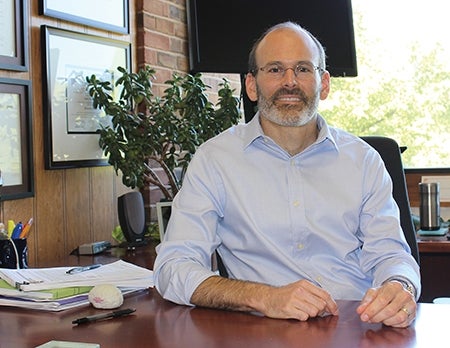Health profile: Dr. Judson Brewer
 Dr. Judson Brewer is the director of research, Center for Mindfulness, University of Massachusetts Medical School.
Dr. Judson Brewer is the director of research, Center for Mindfulness, University of Massachusetts Medical School.
When Judson Brewer started meditating in medical school, he began to notice how his own thought patterns were holding him back and causing him stress. Then, during his rotations, he started to notice how those same thought patterns were probably manifesting themselves as other medical issues in his patients -- or at least making the illnesses they were dealing with more difficult. It was then that he realized fusing psychiatric training with his own mindfulness practice had the potential to transform how patients are treated.
Today, Brewer is a psychiatrist and an internationally known mindfulness expert, and studies how mindfulness techniques, such as meditation, can affect the addictive process. He has developed and tested several mindfulness-based treatment programs for addiction, including mobile-based programs.
Q: How did you start meditating?
A: I was stressed out. I was engaged to my college sweetheart. We were going to the same medical school, and then realized we probably weren’t supposed to be together. We broke up ... I was having trouble sleeping for the first time in my life. That’s when I started meditating and realized, oh I’m actually contributing to this with my mind racing.
Q: How would you define mindfulness?
A: People define it many different ways. I think of it operationally as awareness that’s not being pushed or pulled. Take positive and negative reinforcement. If there’s something pleasant and we have a pleasant experience, we want to hold on to that pleasant experience. If there’s something negative, we’re trying to make it go away. What we’re not aware of is what’s going on in our brain -- ‘I want more of this, I want less of this, I want more of this…’ and we’re doing this all the time! So mindfulness helps us see this natural awareness that we have -- awareness of the push and the pull. It’s about seeing when we’re taking something personally, when we’re holding on to something or pushing something away and realizing we’re doing that, and that it’s optional.
Q: How do you use it to help treat your patients?
A: It depends on the patient. I run an addiction clinic here at UMass, and I work with a number of addictions, including stress eating because that falls into the same addictive pattern. If I have a patient who is having trouble sleeping, and sometimes I won’t even mention the word ‘mindfulness’ but I’ll say, ‘when your head hits the pillow, does your mind start going?’ And they go, ‘yeah.’ So I can teach them a body scan [meditation] for example. And we walk them through noticing the physical sensations in their legs or wherever. We tell them, ‘notice the difference between your awareness on your body versus your mind racing.’ The body scan can help you not get caught up in this. In other cases, if it’s somebody coming in for stress eating, I can give them specific practices, or refer them to our app-based training ‘eat right now’ program and we meet once a month to see how they’re doing.
I really see evidence-based mobile health as the future. There aren’t enough psychiatrists around, so you can check in with people occasionally but they have training every day right on their phone.
Q: How do you respond to skepticism from the Western medical community?
A: I would say read the literature. There have been thousands of papers published in good journals, there was a good meta analysis that came out in 2014 in the Journal of the American Medical Association, showing that while a lot of modalities need further study, there’s really good evidence for depression, anxiety, chronic pain, for stress. There are some other reviews showing impacts on addiction. While this is a very young field, it’s been around for 35 years now, and it’s exploded in the last decade in terms of how much scientific literature has come out.
Q: How can mindfulness be an effective tool in treating patients with conditions they might not see as psychological -- chronic pain, or other chronic conditions?
A: There are some components of pain, especially with chronic pain, where there’s not going to be a treatment that helps it. Our lives are based around suffering -- I’m either suffering or not. So when I resist my pain, there’s more suffering. But when resistance goes down, there’s less suffering, even with the same amount of pain. This is where mindfulness comes in and helps out with these types of things.
This interview was conducted by and edited for length and clarity by Laura Finaldi.













0 Comments